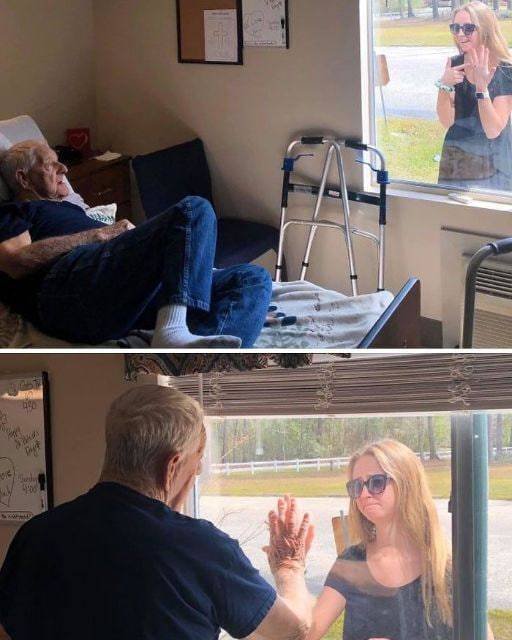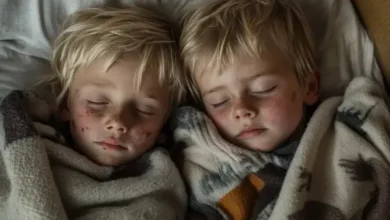I HADN’T SPOKEN TO MY DAD IN 6 YEARS — NOW I CAN ONLY SEE HIM THROUGH GLASS.

Even though I was thirty and had my own place across town, he still called me “his little girl.” We were very close — until we weren’t.
Six years ago, we had a fight. A stupid one, honestly. It started over politics, but underneath it was grief, control, and two people who no longer knew how to speak the same language. That day, I slammed the door on him. Neither of us reached out after that.
Then came the call.

A woman from the care facility told me he’d been admitted a month ago. Early signs of dementia, followed by pneumonia. They were understaffed. No visitors allowed. I hadn’t even known he’d left his house.
I drove there the next morning, my heart racing like I was heading into a courtroom, not a nursing home. When he saw me outside his window, he just stared. I waved. He blinked. Then, slowly, he sat up.
That second photo? That was the first time we had “touched” in nearly five years. Even through glass, it broke me.
He couldn’t say much — barely anything — but he raised his hand, and I matched it. I told him I was sorry. I don’t know if he heard me, or understood what I meant. But he closed his eyes, just for a second, like he was holding something precious.
I didn’t tell anyone I went. Not my brother. Not even my partner. And I still haven’t listened to the nurse’s voicemail.
I might not be ready.
I waited three days before I played the message. The nurse’s voice was calm, but firm:
“Your father’s changing. He’s asking for you. Please come soon.”
Asking for me? That didn’t make sense. My dad hadn’t asked for anything since our fight. On holidays, birthdays, family gatherings — he kept his distance. Why now?
I was consumed by guilt. Maybe this was my chance to make things right before it was too late. I packed a bag, kissed my partner goodbye without saying where I was going (because I wasn’t sure myself), and returned to the facility.
This time, they let me in. The lobby smelled like disinfectant and old carpet. The fluorescent lights buzzed overhead. A young assistant led me down a hallway lined with half-open doors, each offering a glimpse into lives paused by age or illness. She stopped at Room 12 and knocked gently.
“Come in,” said a weak voice I barely recognized.
I froze in the doorway. He looked smaller than I remembered, his broad shoulders hunched beneath the blankets. His hair was mostly gray, his face thinner and more fragile. But those sharp blue eyes — the ones that always saw straight through me — were still there.
“Hey,” I said nervously, standing just inside the door.
“Close the door,” he said clearly. “You look like you’re about to run.”
I hesitated, then obeyed. Sitting in the chair beside his bed felt like walking into a dream where everything was familiar but just slightly off. We sat in silence for a while. He watched me studying the patterns on his blanket.
Finally, he asked,
“Why did you come?”
His question caught me off guard. Wasn’t it obvious? He was sick. He needed someone. I owed him… but none of those answers felt right.
“I got your message,” I said quietly. “They said you asked for me.”
He nodded slowly, like he was agreeing with something he’d been turning over in his mind.
“I want you here. Before…”
He didn’t finish the sentence.
Before what? Before he forgot me? Before he lost the ability to speak? Before he died? All of it lingered between us.
“Do you remember our last conversation?” I asked, softly, bracing for anger or regret.
He gave a dry, raspy laugh.
“Of course I do. You left calling me stubborn and pig-headed. Fair enough.”
My jaw dropped.
“What?”
“Oh, don’t look so surprised,” he said with a small wave of his hand.
“I knew I was difficult. You weren’t easy either, sweetheart. You’ve got my temper, you know.”
For the first time in years, I smiled. At him. At us. At the absurdity of sitting there trying to heal something that had been broken for so long. But the laugh had cracked the ice.
That day, we talked for hours. About everything. About nothing. About Mom, whose passing six years ago was the real beginning of the rift. About my job — which he admitted he didn’t fully understand, but was proud of me anyway. About my brother, the peacemaker, who probably resented us both.
At one point, he gripped my hand with surprising strength and said,
“I never stopped loving you. I just didn’t know how to show it.”
Tears welled in my eyes.
“I never stopped loving you either, Dad.”
Two weeks later, I got another call. This time from my brother. His voice cracked as he told me:
Dad had passed away peacefully in his sleep.
I cried harder than I expected. Not just because he was gone — but because we’d found each other again in time. Because we forgave each other. Because love, in the end, won.
At the funeral, people shared stories about my father’s kindness, generosity, and humor. Each story painted a picture of a man I wish I’d known better. As I stood at his grave holding a white rose, I realized something:
It’s never too late to mend what’s broken.
Life is messy and unpredictable.
We hurt each other — sometimes on purpose, sometimes not.
But forgiveness is what lets us move forward — even if only for a moment.
Let go of the grudge.
Make the call.
Write the letter.
Visit if you can.
You may not get another chance.





